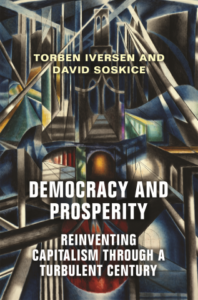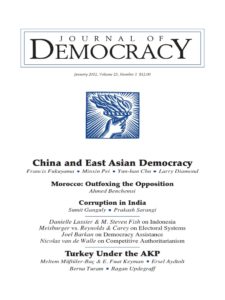 Countries rated ‘not free’ are increasingly able to offer their citizens high incomes, Will democratic ideals lose their appeal? Roberto Stefan Foa and Yascha Mounk ask in the Wall Street Journal:
Countries rated ‘not free’ are increasingly able to offer their citizens high incomes, Will democratic ideals lose their appeal? Roberto Stefan Foa and Yascha Mounk ask in the Wall Street Journal:
Today, 376 million people live in deeply unfree countries—including Russia, Kazakhstan and the Gulf states—that have per capita incomes above $20,000 in terms of purchasing-power parity. In China’s coastal region, average incomes have already risen above this level, and the major cities have surpassed $35,000. When China as a whole crosses above $20,000 in per capita income, which the IMF estimates will happen next year, 1.8 billion people around the world will live in upper-income authoritarian regimes.
This development carries enormous implications for the future of democracy, say Foa and Mounk, contributors to the NED’s Journal of Democracy:
 Whether democracy or autocracy rules the world in the 21st century is thus likely to depend on a number of pivotal countries that could end up as part of either camp. If countries such as India, Nigeria and Indonesia manage to build stable and affluent democracies, the principles of liberty and equality have a chance to maintain and extend their influence in the coming decades. But if these crucial “swing states” turn autocratic while becoming rich, democrats will have a harder time making their case.
Whether democracy or autocracy rules the world in the 21st century is thus likely to depend on a number of pivotal countries that could end up as part of either camp. If countries such as India, Nigeria and Indonesia manage to build stable and affluent democracies, the principles of liberty and equality have a chance to maintain and extend their influence in the coming decades. But if these crucial “swing states” turn autocratic while becoming rich, democrats will have a harder time making their case.
Democratic governments are good for justice and bad for the economy, while competitive markets are just a good thing. Or perhaps it is the other way around. The debate on the relationship between electoral politics and rising standards of living is long-standing and has a new urgency, says Reuters analyst Edward Hadas. Torben Iversen and David Soskice’s “Democracy and Prosperity: Reinventing Capitalism through a Turbulent Century” persuasively argues that the two are mutually supportive, he writes:
- First, democratic governments and competitive markets really do get along. It is not an accident that every single advanced economy has a multi-party system of representative government. This ensures that all the economic classes and interest groups have a voice, and encourages the compromises needed to keep social peace as the economy evolves…
 Second, democracy can be expected to evolve along with the economy. … The development of a hyper-skilled, largely urban elite class in the current age of information and communications technology is bringing further political changes. For Iversen and Soskice, the discontent with legacy centre-left and centre-right parties in so many advanced economies is entirely caused by those groups’ failure to offer comfortable political homes to this articulate and economically influential group.
Second, democracy can be expected to evolve along with the economy. … The development of a hyper-skilled, largely urban elite class in the current age of information and communications technology is bringing further political changes. For Iversen and Soskice, the discontent with legacy centre-left and centre-right parties in so many advanced economies is entirely caused by those groups’ failure to offer comfortable political homes to this articulate and economically influential group.- Finally, globalisation does not doom national politics. Iversen and Soskice reject the conventional wisdom that multinational companies are too powerful to be reined in by national authorities. They point out that today’s skilled workers need to be kept happy and cannot easily be replaced or transported. The plausible conclusion is that governments cannot be bullied by threats of moving investments in advanced industries.
“What ultimately makes advanced democratic capitalism resilient in the face of technological change and the rise of the populist challenge is the continued expansion of education combined with opportunity in the advanced sectors,” Iversen and Soskice conclude. “Only in an extreme crisis like the Great Depression is there a serious risk that populism may grow so widespread that the foundations of both advanced capitalism and democracy will come under attack.”







